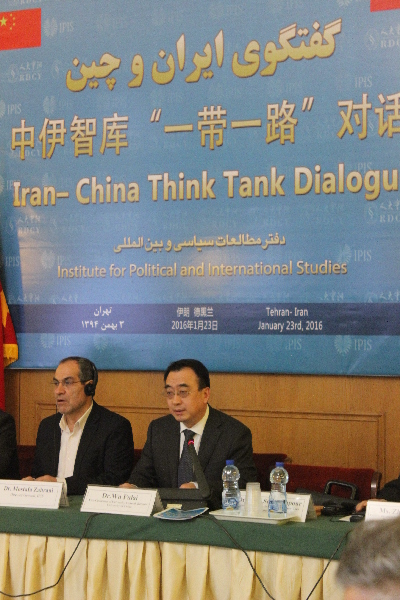1st China-Iran 'Belt and Road' think tank dialogue opens in Tehran
 0 Comment(s)
0 Comment(s) Print
Print E-mail China.org.cn, January 24, 2016
E-mail China.org.cn, January 24, 2016
Simultaneously with the start of Chinese President Xi Jinping's state visit to Iran on January 23, the China-Iran Think Tank Dialogue on the "Belt and Road Initiative" was held in Tehran.
|
|
| 1st China-Iran Think Tank Dialogue on 'Belt and Road' opens in Tehran. [RDCY] |
Supported by the National Development and Reform Commission of the People's Republic of China (NDRC) and Foreign Affairs Ministry and Economic Affairs Ministry of the Islamic Republic of Iran, this first-ever meeting of its type attracted much attention from high-level policy makers of both sides.
It can be considered one of the most important achievements of President Xi's visit to Iran, marking a big step forward for China in promoting the "Belt and Road Initiative," especially in the field of policy communications.
Tian Jinchen, secretary of Western Region Development Department of the NDRC who shoulders the specific task of promoting the "Belt and Road" for the central government, pointed out in his opening speech that China attached great importance to developing close relations with Iran, which were of great strategic significance and had huge development potential.
China was willing to work together with Iran, focusing on implementation of the "Five Connectivity Goals" under the framework of the "Belt and Road." The two countries could jointly explore mutual complementary advantages in related fields, and develop a suitable cooperation mode to build community of responsibility, destiny and common interests, he said
Wu Fulai, vice-chairman of university council of Renmin University of China, said President Xi's visit would become a landmark event as the political situation of Middle East was at a turning point. As the outreach event of Xi's visit to Iran, the dialogue would also create history. It would make splendid achievements in China-Iran cultural exchange history as the Ministry of Foreign Affairs of China, NDRC, Renmin University of China and the Iranian Foreign Affairs Ministry would sign a Memorandum of Understanding for the think tank's establishment.
Nearly 200 guests from the government, existing think tanks, financial and business fields attended the opening ceremony, including Zhang Yanling, former executive vice president of the Bank of China, Wu Sike, former special envoy in the Middle East, Mostafa Zahrani, director general of the Iranian Institute for Political and International Studies (IPIS), and Hussein Malik,former Iranian ambassador to China.
The two sides exchanged views on the topics such as current international hotspots, comprehensive analysis of the "Belt and Road Initiative," cooperation and challenges from a regional perspective and development of bilateral relations.
Chongyang Institute for Financial Studies of Renmin University of China (RDCY) is one of the hosts of the dialogue. Its Executive Dean, Wang Wen, who has been to Iran four times in the past year, deeply felt that Iran was "on the eve of an energy release" in regard to further development. In his article entitled "Rediscovering 'the risen Iran'," Wang mentioned. "China has been relatively unfamiliar with Iran for many years. In fact, depending on the long-term national stability, Iran has been promoting the expansion of Shia and exploring the discourse power in the Middle East for a long time, as the traditional leading powers, for example, Egypt, Iraq, Saudi Arabia, Syria and Turkey, greatly weakened. The international influence of Iran has reached a new height since the Khomeini revolution 35 years ago and it is becoming a rising power."
China should re-understand this aspect as President Xi makes the first visit to Iran by a Chinese leader for 14 years. Wang said that, currently, Iran's "national potential valuation" was still underestimated and its "valuation expectations" should be evaluated more highly. President Xi's visit could be described as catching the "opening price" chance on cooperation with Iran and would open up a new chapter of Chinese diplomacy.
During the dialogue, the two countries signed the "Memorandum of Understanding between the Ministry of Foreign Affairs (Iran), the Iranian Institute for Political and International Studies (IPIS), the National Development and Reform Commission and Renmin University of China."
Both sides will promote exchanges and cooperation in the academic and research fields, improve exchanges of experts or researchers, and promote joint research on several important projects. The MOU is the first international think tank cooperation agreement on the "Belt and Road" through the cooperation of official and academic organizations between the two big powers.







Go to Forum >>0 Comment(s)